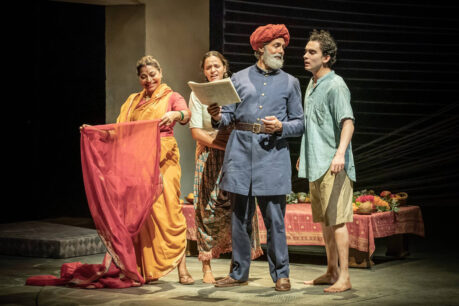The Father and the Assassin
Shehrazade Zafar-Arif, December 24, 2023

The audience in the Olivier Theatre, I noticed, was surprisingly white for a play that felt so quintessentially Indian. While it was heartening to see such an interest in South Asian history, my history, it made me wonder whom exactly this play had been written for.
Written by Anupama Chandrasekhar and directed by Indhu Rubasingham, The Father and the Assassin told two stories in parallel: the familiar one is the story of Mahatma Gandhi and the Indian independence movement. The other is life of Nathuram Godse, from his unusual childhood to his eventual radicalisation, his journey from hero-worshipping Gandhi to becoming the man who would assassinate him.
Godse’s narration framed the performance. From the moment he strode on stage and greeted us with a mocking ‘What are you staring at? Have you never seen a murderer up close before?’ he attempted to lay claim over the story and sell us his point of view. From his position on the lip of the stage, he constantly interjected with sarcastic asides and quips, as well as breaking the fourth wall with references such as ‘that fawning Attenborough film with Sir Ben Kingsley’, reminding us that Gandhi’s story has been told over and over, but he, Godse was here to offer us a different perspective.
But Godse was not the only narrator of the story – others characters constantly interrupted him, sometimes by running across the stage to steal the spotlight from him, much to his obvious annoyance. His childhood friend Vimala (Aysha Kala) was his most staunch opponent – ‘she keeps appearing like an unwanted apostrophe,’ Godse observed bitterly. In many ways this made being a part of the audience feel like being on a jury, listening to the trial of Godse’s life. The most nerve-wracking instance of this was the moment before the assassination, where both Ghose and Gandhi stepped out of the story to hold a debate, and it almost felt, for a heart-stopping moment, as if history was going to be averted.
Despite Godse’s attempts to divert our attention, the beating heart of the story was the story of India, and the highlight for me was seeing the independence movement played out on a British stage, in all its contradictory, conflicting nuance and tragedy. The depiction of Partition was the most harrowing: jubilant celebrations marked by the unfolding of two enormous flags, Indian and Pakistani, gave way to a quiet scene of horror as nameless characters recited accounts of the brutalities they endured during the migration, possibly lifted from real-life stories, while white flags fell from the rafters. The silence in the audience was a palpable thing.
That isn’t to say Godse fell to the wayside. Hiran Abeysekera played Godse superbly as gleefully unrepentant, puckishly manic, and darkly comedic. He shifted rapidly between endearing and repugnant, more and more so the latter as we saw him fall deeper into Hindu nationalism under the tutelage of Vinayak Savarkar, played chillingly by Tony Jayawardena as the final of Godse’s many and flawed father figures.
Rubasingham made the decision to have the adult actors play their childhood selves rather than casting child actors for the earlier portions of the story, which was slightly jarring, particularly in the scenes where we see them playing spitting games. It was made worse by the actors’ attempts to portray childishness by pitching their voices at a higher register, and took me out of the performance slightly. Yet it injected a greater layer of bathos into Godse’s childhood, where his parents, made paranoid by the deaths of three infant sons, raised him as a girl and presented him as the avatar of the goddess Durga.
Though Godse was insistent that this was his story, the figure of Gandhi loomed inevitably over the performance – even on the theatrical poster, his image dwarfed Godse’s. But the production didn’t shy away from the long shadow cast by his legacy, and it refused to be intimidated by the countless other portrayals of Gandhi in fiction. Rather than having him be a faceless figure whose impact is felt rather than seen, forcing our attention on Godse, Chandrasekhar’s Gandhi was cheerfully, unapologetically in our sightline. Paul Bazely brought a cheeky, impish charm to the role, portraying a grounded and fallible version of Gandhi. He was rarely reified, other than a moment where a spotlight illuminated him as he poured salt from his hands at the culmination of the Salt March.
Rajiha Shakri’s set was simple but immersive, with a rotating platform that converted from the back of a school building to the interior of a tailor’s shop, like looking into a kaleidoscope which showed different pieces of India at different points in time. It changed with the same frenetic pace as the timeline did, jumping between the lead-up to Independence and the fallout of Godse’s assassination of Gandhi. The backdrop of a loom and cloth evoked the sense of India without falling into clichéd or bombastic representations of the country. With a relatively small company, the actors still managed to convey the sense of multitudes, evoking the immensity of the Indian subcontinent and the staggering scale of the migration that followed Partition.
Who was The Father and the Assassin written for? The Indians and Pakistanis in the audience, some visitors and others British to their core and yet others who would still call themselves immigrants? For the white British who dominated the theatre, confronted with an unpleasant history that is usually brushed under the rug in classrooms?
The question was answered, somewhat, for me by Godse’s final monologue, in which he raged and ranted at the audience, urging us to follow his example and turn out the outsiders and invaders in the country, parroting much of the far-right rhetoric heard both in modern-day Britain and India.
Godse was clearly aware of the time and place his audience was in, making mockingly topical references such as ‘Mountbatten, who was hell-bent on a hard Brexit’ and asking us to ‘suspend our British scepticism’. In endearing us to Godse through his childhood and his intimate proximity to the audience, Chandrasekhar shone a light on how the fury of nationalism tips over into the violence of extremism, in a cautionary tale that felt chillingly relevant without being overly didactic.





